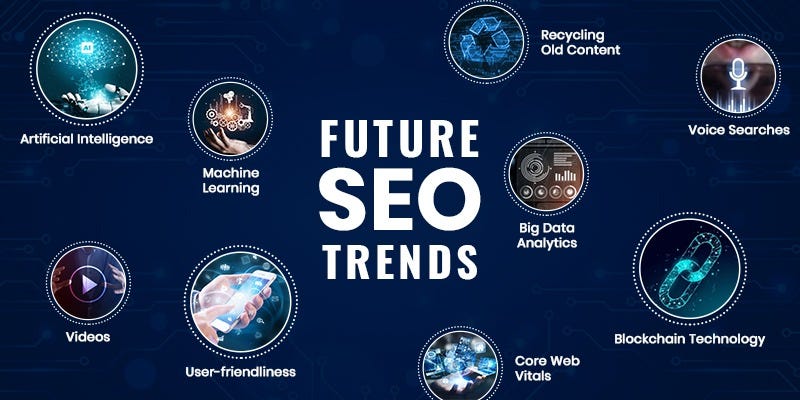2024 SEO Game-Changers: Trends and Tactics for Success

Are you ready to dominate the search engine rankings in 2024? Stay ahead of the curve with these cutting-edge SEO trends! Don’t get left behind — embrace the future of SEO now and watch your traffic soar!
In the ever-evolving landscape of digital marketing, staying updated with the latest SEO trends is crucial for maintaining and improving your website’s search engine ranking. As we step into 2024, several new trends are emerging that can significantly impact your SEO strategy. This blog explores these trends, backed by examples, statistics, and actionable insights.

7 Key SEO Trends to Follow in 2024 & Beyond:
1. AI and Machine Learning in SEO
AI and machine learning are becoming increasingly integral to SEO. Google’s RankBrain and BERT algorithms are prime examples of how AI is being used to improve search results.

Why It Matters:
- According to BrightEdge, 60% of marketers believe that AI is crucial to their SEO strategy.
- Gartner predicts that AI will manage 80% of customer interactions by 2025.

Examples:
- Google RankBrain: Google’s AI-based algorithm helps understand search queries better, making it essential for websites to produce high-quality, relevant content.
- MarketMuse: This AI-driven content research and optimization platform helps marketers create content that ranks by analyzing top-performing content and suggesting improvements.
2. Voice Search Optimization
With the growing use of smart speakers and voice assistants, optimizing for voice search is becoming increasingly important. By 2024, it’s expected that 50% of all searches will be voice searches.

Why It Matters:
- ComScore reports that 50% of all searches will be voice searches by 2024.
- According to Google, 27% of the global online population is using voice search on mobile.
Examples:
- FAQs and Conversational Keywords: Websites are increasingly using FAQ pages and conversational keywords to match natural speech patterns.
- Local SEO: Voice search often involves local queries, making it vital for businesses to optimize for “near me” searches.
3. Mobile-First Indexing
Google’s shift to mobile-first indexing means that the mobile version of your website is now the primary version considered for ranking. This change emphasizes the importance of having a mobile-friendly site.

Why It Matters:
- According to Statista, mobile devices accounted for 54.8% of global website traffic in the first quarter of 2021.
- Google reports that 70% of websites are already mobile-first indexed.
Examples:
- Responsive Design: Ensuring your website is responsive and offers a seamless user experience across all devices.
- Accelerated Mobile Pages (AMP): Using AMP to improve mobile page load times and enhance user experience.

4. E-A-T (Expertise, Authoritativeness, Trustworthiness)
Google’s E-A-T guidelines are crucial for content creators and websites. Demonstrating expertise, authoritativeness, and trustworthiness can significantly impact your ranking.
Why It Matters:
- According to a study by SEMrush, websites that score high on E-A-T have better rankings.
- Google’s Quality Rater Guidelines emphasize the importance of E-A-T in assessing content quality.

Examples:
- Author Bio Pages: Including detailed author bio pages to showcase expertise and credentials.
- Citing Reliable Sources: Using credible sources and backlinks to reputable sites to enhance trustworthiness.
5. Core Web Vitals
Google’s Core Web Vitals are a set of metrics that measure the user experience on your site, focusing on loading performance, interactivity, and visual stability. These metrics are now a significant ranking factor.

Why It Matters:
- Google announced that Core Web Vitals would become ranking signals in 2021, emphasizing their ongoing importance.
- According to a study by Screaming Frog, 12% of websites met all three Core Web Vitals standards in 2021.
Examples:
- Optimizing Page Speed: Reducing page load times through image optimization, efficient coding, and leveraging browser caching.
- Improving Interactivity: Ensuring that your site is responsive and interactive, providing a seamless user experience.
6. Video SEO
With the rise of video content, optimizing videos for search engines is becoming more important. Video SEO involves optimizing your videos to be indexed and rank on the search engine results pages (SERPs) for relevant keyword searches.

Why It Matters:
- Cisco predicts that by 2022, online videos will make up more than 82% of all consumer internet traffic.
- According to HubSpot, 54% of consumers want to see more video content from brands they support.
Examples:
- YouTube SEO: Optimizing video titles, descriptions, and tags to improve visibility on YouTube and Google search.
- Video Transcripts: Including transcripts for videos to improve accessibility and SEO.
7. AI-Driven Personalization and the Resurgence of Email Marketing
AI-driven personalization allows marketers to tailor content, recommendations, and communications to individual users, enhancing engagement and conversion rates. Coupled with the resurgence of email marketing, this trend is proving to be a game-changer.

Why It Matters:
- According to Epsilon, personalized emails deliver 6x higher transaction rates.
- Statista reports that the number of email users worldwide is expected to grow to 4.6 billion by 2025, highlighting the ongoing relevance of email marketing.
Examples:
- Netflix: Netflix uses AI to recommend shows and movies based on individual viewing habits, enhancing user experience and retention.
- Amazon: Amazon’s personalized email recommendations are tailored to individual browsing and purchase history, driving repeat purchases and customer loyalty.
Don’t get left behind in 2024! Stay ahead of the SEO curve by embracing these trends and watch your rankings soar. The future of search is here — are you ready to adapt and thrive?

Conclusion
The SEO landscape in 2024 is being shaped by AI, voice search, mobile-first indexing, E-A-T, Core Web Vitals, video SEO, AI-driven personalization, and hyper-personalized marketing. By staying ahead of these trends and implementing the latest best practices, you can enhance your website’s visibility, improve user experience, and drive more organic traffic. Start adapting to these trends today and future-proof your SEO strategy for success.
Comments
Post a Comment